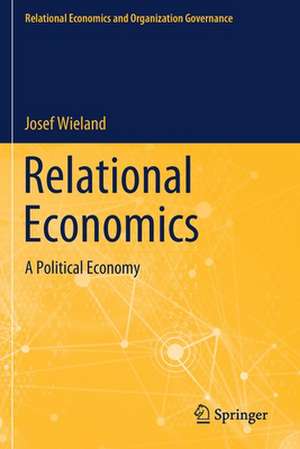Relational Economics: A Political Economy: Relational Economics and Organization Governance
Autor Josef Wielanden Limba Engleză Paperback – 29 mai 2021
The author develops a categorical taxonomy for private and public value creation based on the effective and efficient interlinking of, and interaction between, a range of resources and abilities. In contrast to mainstream economics, which largely focuses on the laws of discrete and dyadic exchange transactions, this book assesses the polyvalent characteristics of relational transactions.
The chief categories involved in an economic theory of the relations between events are the relational transactions and their various forms of governance; the polycontextual cooperation between economic, political andcivil society agents; and the factor incomes and relational rents that relational transactions produce. Today, relational transactions are the rule, not the exception, in modern economies and their global value creation networks. Given its scope and focus, this book will appeal to scholars of economics, economic sociology, organisational studies and related fields.
| Toate formatele și edițiile | Preț | Express |
|---|---|---|
| Paperback (1) | 381.59 lei 6-8 săpt. | |
| Springer International Publishing – 29 mai 2021 | 381.59 lei 6-8 săpt. | |
| Hardback (1) | 389.88 lei 6-8 săpt. | |
| Springer International Publishing – 29 mai 2020 | 389.88 lei 6-8 săpt. |
Preț: 381.59 lei
Nou
Puncte Express: 572
Preț estimativ în valută:
73.02€ • 76.59$ • 60.79£
73.02€ • 76.59$ • 60.79£
Carte tipărită la comandă
Livrare economică 01-15 aprilie
Preluare comenzi: 021 569.72.76
Specificații
ISBN-13: 9783030451141
ISBN-10: 3030451143
Pagini: 168
Ilustrații: XI, 168 p. 26 illus.
Dimensiuni: 155 x 235 mm
Greutate: 0.26 kg
Ediția:1st ed. 2020
Editura: Springer International Publishing
Colecția Springer
Seria Relational Economics and Organization Governance
Locul publicării:Cham, Switzerland
ISBN-10: 3030451143
Pagini: 168
Ilustrații: XI, 168 p. 26 illus.
Dimensiuni: 155 x 235 mm
Greutate: 0.26 kg
Ediția:1st ed. 2020
Editura: Springer International Publishing
Colecția Springer
Seria Relational Economics and Organization Governance
Locul publicării:Cham, Switzerland
Cuprins
Part I: Transaction and Contract.- Part II: Governance and Polycontextuality.- Part III: The Firm and Polycontextual Management.- Part IV: Cooperation Rent and Societal Value Creation.
Notă biografică
Prof. Josef Wieland is the Chair of Institutional Economics, Organizational Governance, Integrity Management & Transcultural Leadership, and Director of the Leadership Excellence Institute Zeppelin (LEIZ) at Zeppelin University, Germany. He is an expert in the field of responsibility, values, and compliance in local and global production networks. With more than 20 years of research experience in the field, he initiated the Forum Compliance & Integrity (FCI). He chaired the German Network of Business Ethics (DNWE) and is a member of, e.g., the National CSR Forum and the jury for the German government’s CSR Award. During Germany’s G20 presidency in 2016/2017, Prof. Wieland co-chaired the working group on “Sustainability in Global Value Chains” as part of the Think20 process. In 2004, he received the highly estimated State Research Prize for Applied Research from the State of Baden-Württemberg. Since 2017, he is Vice-President (Research) of Zeppelin University, Friedrichshafen, Germany.
Textul de pe ultima copertă
This book introduces the research agenda of relational economics as a political economy for the governance of local and global economic transactions in modern societies. It analyses the mechanisms of global value creation and production networks by studying cooperation in intra- and inter-firm networks, intersectoral stakeholder management, and transcultural leadership.
The author develops a categorical taxonomy for private and public value creation based on the effective and efficient interlinking of, and interaction between, a range of resources and abilities. In contrast to mainstream economics, which largely focuses on the laws of discrete and dyadic exchange transactions, this book assesses the polyvalent characteristics of relational transactions.
The chief categories involved in an economic theory of the relations between events are the relational transactions and their various forms of governance; the polycontextual cooperation between economic, political and civil society agents; and the factor incomes and relational rents that relational transactions produce. Today, relational transactions are the rule, not the exception, in modern economies and their global value creation networks. Given its scope and focus, this book will appeal to scholars of economics, economic sociology, organisational studies and related fields.
The author develops a categorical taxonomy for private and public value creation based on the effective and efficient interlinking of, and interaction between, a range of resources and abilities. In contrast to mainstream economics, which largely focuses on the laws of discrete and dyadic exchange transactions, this book assesses the polyvalent characteristics of relational transactions.
The chief categories involved in an economic theory of the relations between events are the relational transactions and their various forms of governance; the polycontextual cooperation between economic, political and civil society agents; and the factor incomes and relational rents that relational transactions produce. Today, relational transactions are the rule, not the exception, in modern economies and their global value creation networks. Given its scope and focus, this book will appeal to scholars of economics, economic sociology, organisational studies and related fields.
Caracteristici
Introduces a theoretical basis for the governance of relational transactions Presents a research agenda of relational economics Studies the network, stakeholder and leadership mechanisms of global value chains




